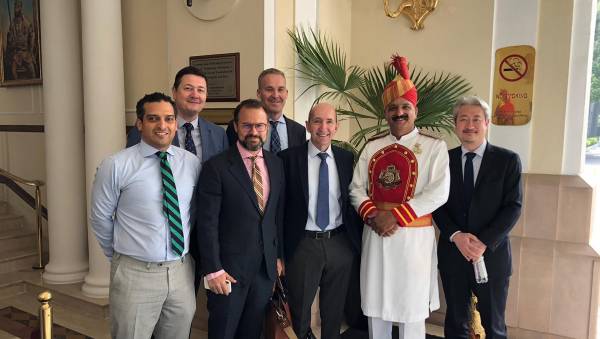
Sam Hill: Adaptation required to stay ahead

It is mid-morning in Singapore and Sam Hill MInstD, an expat Kiwi originally from Hawke’s Bay, is working from home and taking some reprieve from the heat.
The qualified lawyer worked in a private practice in Wellington, followed by an in-house role for an NZ/ASX-listed company, before moving to Qatar (Doha) where he spent five years. Soon he will be hitting the eight-year mark in Singapore, where he works for a large international energy company which has headquarters in Paris.
It would be fair to say Hill has an international perspective on the modern economy.
“The project I am currently working on is based in East Africa, but we have customers and stakeholders all around the world, so it’s truly an international project and we’re in the centre of it in Singapore,” Hill says.
Immersed in high-pressure corporate life, Hill describes the business landscape in Singapore as “extremely competitive and cut and thrust”, and says while governance can sometimes appear rigid and process driven, it is always “stable and trustworthy”.
“Since independence in the 60s, Singapore has enjoyed this extraordinary growth story. It’s astonishing and the success, in part, was down to a very effective task-focused-type approach with a well-educated workforce.”
Hill says this approach has also bled into governance practices, informing how things are done. But that’s not to say it should stay that way. Fast-paced innovation and technology is a mainstay of everyday life for Singaporeans, but old-school quirks remain.
For Singapore to maintain its position as one of the leading economies in Asia – and one of the world’s major financial centres – he believes continuous adaptation will be needed.
“Singapore is a leader in technology. This flows through into how we administer and guide the company here. I suspect we’re going to continually move away from some of the quite old-fashioned board processes to reflect that,” he says.
Hill suggests that in New Zealand, at board level, there is probably a greater emphasis placed on stakeholder values than in Singapore.
“In many ways, life is very competitive here and it’s also very cosmopolitan. You have nearly six million people from all over the globe, occupying an area the size of Lake Taupō. So, to make it all work, there is a laser focus on efficiency and productivity. There is no mucking around. There is immense pride in the effectiveness of the physical and technological infrastructure that supports this,” Hill says.
“Often you see organisations where the culture or the expectation is that the information just flows up to the board – and not so much down from the board. This potentially causes an inappropriate level of aimless internal reporting.”
As for climate change and the environment, Hill is proud of New Zealand’s approach.
While positive steps are being taken in Singapore, he says the scale of the challenge is very evident. At a grassroots level, climate and the environment aren’t as great a focus, due in part to the competitive and price-sensitive nature of the market.
“We’re dealing with the enormous challenge of providing the energy that everyone needs and looking at the fact that, by 2050, there’s probably going to be another two billion people on the planet and most of that population growth is in the Global South (less-developed economies).”
In the bigger picture though, Hill believes New Zealand could learn a lot from Singapore.
First, getting ahead of the game and leading with tech. “I have noticed that tech here seems considerably more advanced than in New Zealand and way more integrated in your day-to-day life. There is an extremely high level of smartphone dependency which I have a love/hate relationship with,” he says.
Second, the importance placed on building relationships in Asia. When time is invested in this area, the benefits are wide reaching, he says. While it takes time to foster those relationships – “a lengthy and delicate process, as part of doing the research” – it has proven successful for business.
“What really motivates someone in Japan might be different to someone in India, versus Indonesia or Europe. That’s what you learn about operating in the international space, to really understand the complexities of the market – and value someone else’s perspective,” he says.

Sam Hill 3rd from left in Delhi
Geopolitics also has a more immediate impact on business and governance in Singapore.
“It’s been eye-opening. The project I work on in East Africa has, for example, been affected by an Islamic insurgency and the Russia-Ukraine situation has had a massive impact on what we do. So, working in a cultural melting pot and international trade centre, you are exposed to all these interesting things that you learn a massive amount from – the impacts of international events are likely to be less acute in New Zealand,” Hill says.
Addressing board strategy, he emphasises the need for boards to be very clear to ensure it is communicated downwards, which isn’t always the case.
“Often you see organisations where the culture or the expectation is that the information just flows up to the board – and not so much down from the board. This potentially causes an inappropriate level of aimless internal reporting,” he says.
As a result, time is wasted preparing irrelevant material. Instead, boards need to be direct with management and tell them exactly what they need, and why.
“Then it’s checking in to make sure that information is constantly updated and refreshed and kept focused and relevant – time is the most precious resource,” he says.
For Hill and his family, the time will eventually come to transition back to New Zealand. He says from a professional standpoint, he will miss the frequent international travel and the opportunity to meet and work with such a diverse group of people. Describing himself as “honestly quite provincial at heart”, Hill is feeling the magnetic pull of New Zealand.
“There’s this great big, beautiful country to enjoy and explore. When we go back, I think we’ll probably get a bit of satisfaction from being involved with the school and the local community, in a less transient environment. That’s something I’m looking forward to.”


